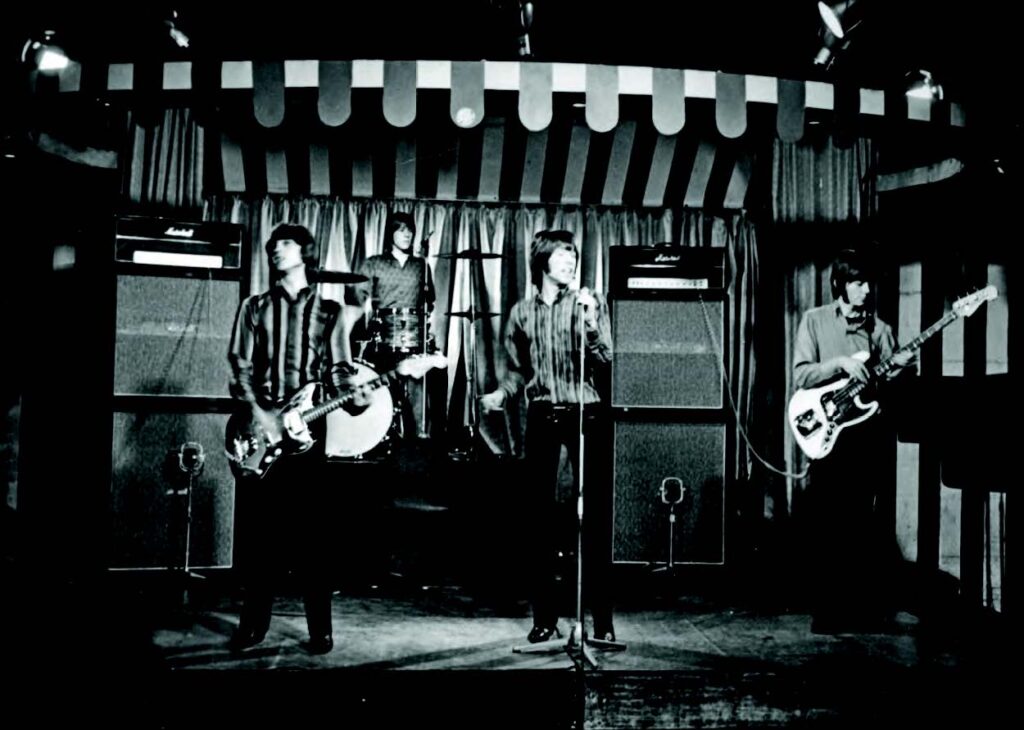Issue #160 – The Smoke
THE SMOKE shocked Britain with their psychsploitation smash ‘My Friend Jack’ and earned a BBC ban – or did they? HUW THOMAS tells the real story of four lads from York who smuggled LSD onto the radio, spat out the Krays, shook German music fans and unwittingly inspired Boney M. It’s Smoke time!
In this extract we unravel ‘My Friend Jack’. Buy the magazine here.

“We were living in Brixton and driving each day to a Mecca bingo hall in Wembley to rehearse,” Lund would recall. “After each session, we would throw ideas around and try to cobble together a new song. Mick Rowley came straight out with the first few lines of ‘My Friend Jack’ and, with Geoff Gill’s help, the song was complete after about 15 minutes.” At the next Lansdowne session, Babson pounced upon ‘Jack’, seeing potential in its infectious melody and scandalous lyrics about ingesting LSD via sugar lumps: “My friend Jack eats sugar lumps…” and “He’s on a voyage across an ocean / Waves of his mind are set in motion.” The group recorded the song in an electric chug arrangement redolent of Chinn & Chapman’s Sweet material that followed years later and, at Babson’s insistence, Mal Luker added a brutal tremolo guitar part, an extraordinary finishing touch. “We were all astounded by the racket he’d made,” Lund enthused in 2002. The Smoke, as the group now called themselves (a name inspired either by northerners’ nickname for London or the group members’ fondness for jazz rollups), had surely made the most infectious pop single to come out of the psychedelic movement yet.
Babson offered ‘My Friend Jack’ to EMI but their chairman Sir Joseph Lockwood strongly objected to the lyrical content. He had the group rewrite the lyrics six times before he was satisfied. “Oh, what beautiful things he sees” became “Sugar man doesn’t have a care”, and “Lost in a wonderland of colour and of sound” became the only slightly less suggestive “He’s seen the hawk fly to hail the setting sun”. However, by the time this bowdlerised version of ‘Jack’ was released on 10th February 1967, the original lyrics had already found their way to the public. The original version was played on pirate radio in advance of the official release. The tenacious pirates had no qualms playing it; they’d only recently helped give The Move their first hit with the nakedly trippy ‘Night Of Fear’ (“Just about to flip your mind, just about to trip your mind”). Quite how they got their hands on an acetate with the original lyrics remains a mystery – we don’t think a covert publicity stunt on EMI’s part can be ruled out. Sir Joseph Lockwood might have officially rejected lyrics about LSD but he also signed the likes of The Pink Floyd and Tomorrow, central veins in London’s underground ecosystem. “Lockwood was a crafty old sod,” The Floyd’s manager Peter Jenner recalled to Rob Chapman. “He knew that we were playing on that psychedelic thing and the drug culture.”
To read the full article order Shindig! issue #160 here

